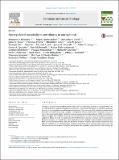Dysregulated metabolism contributes to oncogenesis
Author(s)
Hirschey, Matthew D.; DeBerardinis, Ralph J.; Diehl, Anna Mae E.; Drew, Janice E.; Frezza, Christian; Green, Michelle F.; Jones, Lee W.; Ko, Young H.; Le, Anne; Lea, Michael A.; Locasale, Jason W.; Longo, Valter D.; Lyssiotis, Costas A.; McDonnell, Eoin; Mehrmohamadi, Mahya; Michelotti, Gregory; Muralidhar, Vinayak; Murphy, Michael P.; Pedersen, Peter L.; Poore, Brad; Raffaghello, Lizzia; Rathmell, Jeffrey C.; Sivanand, Sharanya; Vander Heiden, Matthew G.; Wellen, Kathryn E.; ... Show more Show less
DownloadDysregulated metabolism contributes to oncogenesis.pdf (1.530Mb)
PUBLISHER_CC
Publisher with Creative Commons License
Creative Commons Attribution
Terms of use
Metadata
Show full item recordAbstract
Cancer is a disease characterized by unrestrained cellular proliferation. In order to sustain growth, cancer cells undergo a complex metabolic rearrangement characterized by changes in metabolic pathways involved in energy production and biosynthetic processes. The relevance of the metabolic transformation of cancer cells has been recently included in the updated version of the review “Hallmarks of Cancer”, where dysregulation of cellular metabolism was included as an emerging hallmark. While several lines of evidence suggest that metabolic rewiring is orchestrated by the concerted action of oncogenes and tumor suppressor genes, in some circumstances altered metabolism can play a primary role in oncogenesis. Recently, mutations of cytosolic and mitochondrial enzymes involved in key metabolic pathways have been associated with hereditary and sporadic forms of cancer. Together, these results demonstrate that aberrant metabolism, once seen just as an epiphenomenon of oncogenic reprogramming, plays a key role in oncogenesis with the power to control both genetic and epigenetic events in cells. In this review, we discuss the relationship between metabolism and cancer, as part of a larger effort to identify a broad-spectrum of therapeutic approaches. We focus on major alterations in nutrient metabolism and the emerging link between metabolism and epigenetics. Finally, we discuss potential strategies to manipulate metabolism in cancer and tradeoffs that should be considered. More research on the suite of metabolic alterations in cancer holds the potential to discover novel approaches to treat it.
Date issued
2015-10Department
Harvard University--MIT Division of Health Sciences and Technology; Massachusetts Institute of Technology. Department of Biology; Koch Institute for Integrative Cancer Research at MITJournal
Seminars in Cancer Biology
Publisher
Elsevier
Citation
Hirschey, Matthew D. et al. “Dysregulated Metabolism Contributes to Oncogenesis.” Seminars in Cancer Biology 35 (2015): S129–S150. © 2015 Elsevier Ltd
Version: Final published version
ISSN
1044579X